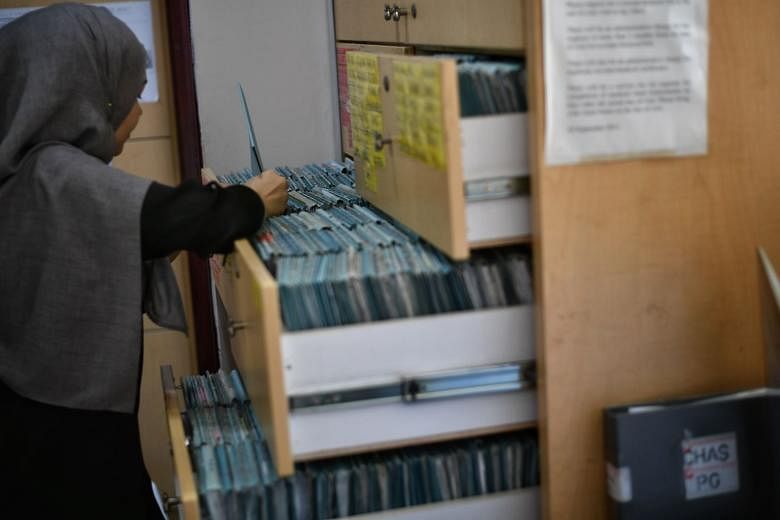SINGAPORE - The move to compel the private healthcare sector into joining the shared national medical database sends a clear message - the Government is done waiting.
Next year, a Bill is expected to be introduced in Parliament to pass the requirement into law.
Private health operators will then have to link their computers to the National Electronic Health Record (NEHR) system, whether they like it or not. Those who fall short will likely face penalties.
The proposed rules will impact more than 4,000 private operators - including general practitioners and dentists, private specialist clinics and hospitals, as well as community care facilities such as nursing homes.
It will be a massive exercise for all of them to get on board.
Yet, the NEHR is not an alien concept to the medical community here, including the private sector. It has been up and running since 2011, and the Health Minister then, Mr Khaw Boon Wan, had spoken of such a system as far back as 2004.
Today, public health institutions, such as restructured hospitals and polyclinics, are linked to the database, which harbours a trove of more than six million unique patient records.
A polyclinic doctor treating a patient for chest discomfort, for example, can check if the patient has been hospitalised before for heart problems at a general hospital. He can also check for drug allergies and test results, such as X-ray scans.
The system holds much promise in terms of promoting seamless healthcare. It could also help patients save money by cutting down on repeat tests at different providers.
In 2012, it was reported that the NEHR was expected to be fully up by 2015 and involve the private sector and step-down facilities.
That year came and went, and till today, the vision of "one patient, one health record" has yet to materialise.
This was because while private operators were urged to join on a voluntary basis, few did.
Only a few dozen general practitioner clinics signed up, out of the more than 1,600 here.
There have been no inputs from the nine private hospitals here.
It is not that they did not have the time to work out how to adopt the system, as well as the work processes that may need to be modified to accommodate the change.
The barriers, it seemed, are more pragmatic - cost being one of them.
Upgrading computer systems or purchasing new software to synchronise with the NEHR can be costly. In Singapore, about 30 IT vendors provide such a service, and even among them, the software specifications may differ.
Linking up to the database is also not something that would significantly increase the clinic's or hospital's revenue.
In fact, it has been suggested that private medical practices may fear losing their patients to rivals, as doctor-hopping would be easier, given that health records can be readily retrieved elsewhere.
The financial impact could hit small clinics hard, too.
That is why a $20 million kitty has been set aside by MOH to fund the transition. Each licensed private operator is entitled to a one-time payout, ranging from $2,400 to $200,000.
This could be a boost to many practices. But the money tides them over only the initial years, so they will eventually have to set aside a budget to keep it going. For instance, to pay the IT vendor monthly fees for the upkeep of the software.
It will be good to explore support measures after the initial period to ensure doctors make meaningful use of the NEHR.
Some GPs who have the NEHR set up have said that they do not use it actively as it can be tedious to digitise their records.
The authorities may want to look more deeply into how a typical GP or specialist works day to day, and adjust the system accordingly.
For example, they could enable the scanning of handwritten notes or introduce a voice recognition function to input data, instead of manual typing.
Health Minister Gan Kim Yong said on Wednesday (Nov 8) that workshops on the new requirements will be offered to doctors and IT vendors.
This is a positive move and could be made even better if these sessions go beyond the technicalities of the system to include a strong ethical element of using the database responsibly.
Patient privacy and confidentiality are a valid concern that has been raised by the private sector and patients themselves.
The authorities have said there are safeguards in place, such as tracking of access and stratified access among healthcare staff.
With so many more doctors able to call up a patient's record, it must be impressed upon all users that one cannot search for data willy-nilly.
There is a limit to how much misconduct audits can uncover, and, as with every man-made system, there is always a chance that someone will find a way to abuse it undetected.
It is thus important for healthcare providers to have strict rules on when and how they use the information, on top of the in-built stringent access to the system.
Admittedly, the path to a national e-database is not an easy one. Apart from some reluctant parties, the technical challenges of aligning thousands of clinics to the system could turn out to be a frustrating process.
Some patients may still baulk at the thought of their health data being more accessible, but even so, the benefits to the individual cannot be denied.
Let's put it this way: If your doctor were to ask you if you had received a specific vaccine before, can you recall that detail offhand, or even the exact year in which you got the jab?
How about the results of your last health screening, or the antibiotics you were last given?
While people should have ownership of their own health, many minute details can get muddied over time. And if one misnames his drug allergy or, worse still, is in no state to talk in times of emergency, it might be a matter of life or death.
Things are even more complex now with the greying society - people are seeing more doctors and suffering from multiple health ailments.
A national shared medical database is not just a noble vision, but a necessary one.
Such a move will fall in line with new technology initiatives in the health sector. One example is a national telemedicine plan that was launched this year and allows more patients to have e-consultations with doctors.
Public hospitals are also tapping technology more than ever, with Ng Teng Fong General Hospital last month recognised for being 99 per cent paperless.
And with Singapore marching ahead with the Smart Nation movement, the database must keep pace - with sufficient safeguards to maintain its integrity.


